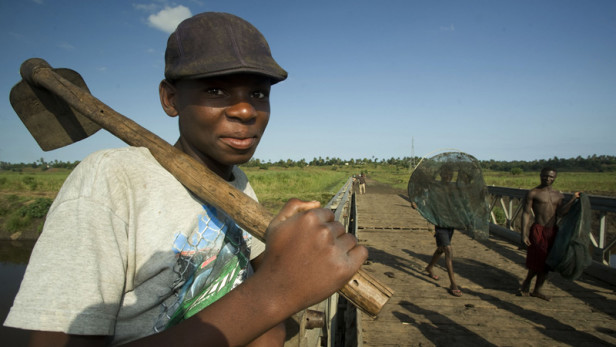Mary Robinson writes in Devex about protecting the rights of the most vulnerable people and the need for urgent action on resilience.
The impacts of climate change do not belong to some distant future. Today, rising sea levels, prolonged drought and more intense and frequent tropical storms are posing an existential threat to people living in vulnerable situations around the world. We must act now to protect those on the front lines of our changing climate.
Despite the great need for urgency of action, the immediate need of people in the most vulnerable situations is sometimes obscured, by the technocratic and abstract nature of the climate negotiations. We must not lose sight of the fact that we already live in a world that is 1 degree Celsius warmer than pre-industrial times. This increase in temperatures is already having devastating consequences for people’s lives and livelihoods in some of the poorest countries in the world.
The first step toward securing more resilient communities around the world is to ensure that the new climate agreement makes the links between states existing human rights obligations and their future climate action. When we talk about resilience, we are talking about the opportunity for people to lives of dignity and opportunity. Many of the people living on the front lines of climate change have never known the benefits of the fossil fuel based development; the model of development that has given rise to the climate crisis and left them disproportionately vulnerable to the impacts.
This is a great injustice that can only be solved by urgent action to reduce emissions and rapidly scale up the resilience of people and communities. We must be alert to the very real possibility that the people in the most vulnerable situations could be left behind as we transition to a zero carbon future. Climate justice demands that we leave no one behind. For me climate justice embodies both parts of a moral argument to act on climate change: being on the side of those who are suffering most and least responsible, while at the same time ensuring that everyone benefits from sustainable development and that no one is negatively affected by our responses to climate change.
To understand a climate justice approach to securing resilience, let us consider the perspective of a woman living on the front lines of climate change in the Sahel. We can assume that she is among the 1.3 billion people globally living in energy poverty, impeding her right to development. Access to sustainable energy enhances resilience to shocks and disasters through improved health and livelihood outcomes.
Moreover, it is likely that social norms dictate that she has the primary responsibility for cooking in her household — exposing her to harmful smoke and fumes from fuelwood and undermining her right to health. The necessity to produce charcoal contributes to the degradation of her local environment further increasing her vulnerability and undermining her right to a healthy environment. The burden of poverty and her social roles are also likely to limit her right to education — and education is the basis of empowerment.
It quickly becomes apparent that when we talk about enhancing resilience, we are actually talking about securing a person’s human rights. We must take care to remember that people everywhere need to be protected from extreme climate impacts, while at the same time paying particular attention to those in the most vulnerable regions such as low lying coastal zones and regions subject to desertification.
Anyone with a basic sense of morality and fairness recognizes that we are all compelled to do what we can to address the fundamental injustice faced by people and communities of the front lines of our changing climate.
By ensuring that the climate action we take respects and protects human rights, and is informed by gender equality, we can empower those people made vulnerable by situations of poverty or social standing to build their own resilience.
Addressing the resilience challenge is urgent, but the reward for addressing it will be great. If effective and urgent action is taken, at the breadth and scale that is required, then the short term financial investment required in adaptation will be returned many times over.
But far more importantly than any financial calculation, urgent action on resilience can protect individual human dignity, and empower people everywhere, through their own efforts, to create a better world for all.
This article was first published in devex on 8 December 2015 as part of the #planetworth series.


